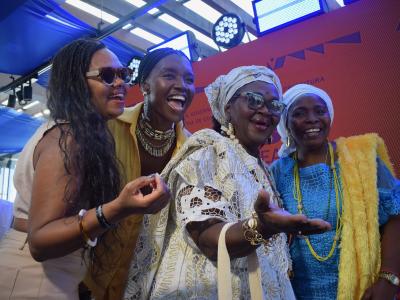Born in Montevideo, the capital city of Uruguay, Maia is characteristically proud of her culture. Though a tiny country sandwiched between the ‘giants’ of Brazil and Argentina, with a population of 3.5 million people, Uruguay makes itself heard throughout the world thanks to its music and, of course, football. It shares a lot of customs with Argentina, such as maté and other cultural traits to do with the countryside. Likewise, the cities of Buenos Aires and Montevideo are both home to tango music - both claiming its true origins. Maia is a singer-songwriter, not only for tango music, but also other folkloric rhythms such as samba and milonga, the Afro-Uruguyan genre. She's toured extensively around South America, including Brazil, Argentina, and Colombia, Italy, Spain and, now, Portugal.
LatinoLife: Where does your passion for music come from?
Maia Castro: I’ve always loved music since I was a little. I learned to dance and sing pretty much at the same time as I learned to walk and talk. When I was very young, I took up piano lessons, followed by guitar and singing lessons. Once I was 15 years old, I started going to carnival. Here, in Uruguay, carnival is a centrepiece of our popular culture. The two events that sell the most tickets in our country are carnival and football matches. My first carnivals were a fantastic learning experience for me. At this young age, I learned how to get up on stage and sing for thousands of people. From there, I started to study lyrical music and more traditional styles of singing. Although this taught me a lot in terms of technique, my heart was always set on popular and folkloric music. From my first carnivals to the music that I produce today, I have always had a deep passion for music.
LL: Growing up, did you listen to tango music?
MC: I grew up listening to a variety of types of music at home from all over the world. We listened to a lot of Brazilian music, especially the jazz artist Antônia Carlos Jobim. We also listened to the Cuban musician, Silvio Rodríguez, and Spanish musician, Joan Manuel Serrat. That’s the music that my parents played at home.
But it was my grandparents and one of my neighbours who introduced me to tango. Growing up, my friend lived opposite me and I used to always go round his house to play. His father was a tango guitarist and I used to always hear him rehearsing with different singers who came to the house. Sometimes, I realise that I already know tango lyrics for songs that I had never sung before or consciously listened to. I know them because of this childhood memory of listening to those tango rehearsals.
LL: What type of music do you listen to now?
MC: I don’t have prejudices towards different types of music. I listen to rock, pop, hiphop, cumbia, and, of course, tango and milonga. I love listening to hearts and flowers but also love listening to the Red Hot Chilli Peppers or the Argentine rapper, Wos. I like discovering genres of music that are a world away from my own.
However, I think that traditional types of music represent our identity most in the River Plate. Tango and milonga are part of our DNA: they belong to us. So I think it’s also important that younger generations also engage with our music. When I’ve gone to play music abroad, I’ve noticed that in other countries, people exclusively associate tango with Argentina. They don’t associate tango with Uruguay. It’s also our responsibility to defend our country’s culture and our national identity and to show the world what we do and what we are. For the size of our population, it’s really impressive how many incredible musicians there are here in Uruguay. I therefore believe that the responsibility falls on the shoulders of the younger generations to keep our music and culture alive. We need them to compose tango and milonga music from a more current different perspective and use music to talk about current issues, so that younger people feel represented.
LL: One of your songs, called “Simplemente”, especially caught my attention, as its not your typical tango video. Can you tell us a little bit about the meaning and motivations behind this song?
MC: My song, “Simplemente”, is all about street harassment. I don’t know about the UK, but, at least in Latin America, it’s very common for women to be cat-called when they are walking down the street. Although some men may say that their chat-up lines are “just complements”, we women don’t see it that way. Luckily, here in Uruguay, things are finally starting to change for the better.
The song talks about the shared experience of women and girls, from childhood to adolescence and adulthood, when they walk along the street. Beyond my own personal experiences, I saw my teenage nieces suffering from these types of situations when they went out alone. It even made them change the way that they dress, or where they go, so that, hopefully, they wouldn’t fall victims to street harassment again.
So, for the song, the idea was that the music and rhythm would take the form of a very traditional milonga. But the lyrics would talk about and reflect a current issue in a very direct way. That way, the message would get through to everyone, no matter who they were. We wanted to make our message loud and clear. However, this song doesn’t intend to accuse anybody. On the contrary, it aims to encourage men to put themselves in women’s shoes and to think about what would happen if the situation were the other way round. It’s important that we put this issue on the table and that we stop pretending that street harassment doesn’t exist.
What always interested me is how tango and milonga are often classified as ‘machista’ or misogynistic. In a way, this is true because lots of tango lyrics reflect a different society at the beginning of the 20th century that was indeed deeply misogynistic. It was a different time during which misogynistic behaviour was the norm and was rarely questioned. But times have changed and today we discuss these issues more openly and such behaviour is now criticised.
So, it seemed really important to me that a really traditional milonga could speak about, and engage with, the present moment. “Simplemente”, allows young people, and people who disagree with the hegemonic values of society, to feel represented by milonga music. I’m not just talking about women, but men too.
I’m not your bird, nor your girl, nor your lover,
I’m just a woman who’s walking down the street […]
I wanna ask you what would happen
If it were the other way round, put yourself in our shoes
(Simplemente, Maia Castro, translated by Clorrie Yeomans)
LL: And so What are your plans for the future?
MC: Recently, I have played in the interior provinces of Uruguay. Soon, we are hopefully going to tour around Portugal. We are going to have four shows, including one at Exib Festival in Setúbal in October. Our next stop is the Casa da America Latina (House of Latin America) in Lisbon. Next, we will play at the Festival das Marias in the city of Beja. So, we already have four concerts lined up but we hope we’ll be able to do more! We welcome any invitations!
Although I’ve never been to Portugal before, I’ve heard great things about its culture, geography, and music. There’s a strong connection between the music here in the River Plate and the music in Portugal. Fado is a typical genre of music from Portugal and I think that it has similar roots to tango and milonga from Uruguay, in terms of its melancholic sound. In fact, when I was queuing in an airport during our European tour, I started to sing and my guitarist brought out his guitar. We were waiting around for our flight, so why not? A couple sat down to listen to our music and when we stopped playing our tango, they asked us if we were singing fado. They were Portuguese and were convinced that we were singing fado. We told them that we were actually playing tango music by the famous tango singer Carlos Gardel. But they spoke to us like it was their own music. This really awakened me to the connection between tango, milonga, and fado.
After the tour, we want to try to bring out new songs and a new album. During the pandemic, we already started preparing our new music. So, we’ve got plenty of music in store! So, this is the plan for the end of this year. Next year (pandemic permitting), we are hoping to plan a longer tour around Europe.
Maia perform on Saturday 23 October at 20:30 21:30 in Plaza Bocage de Setúbal, as part of EXIB and will be streamed online. More info https://www.exibproject.org/exibmusica2021















